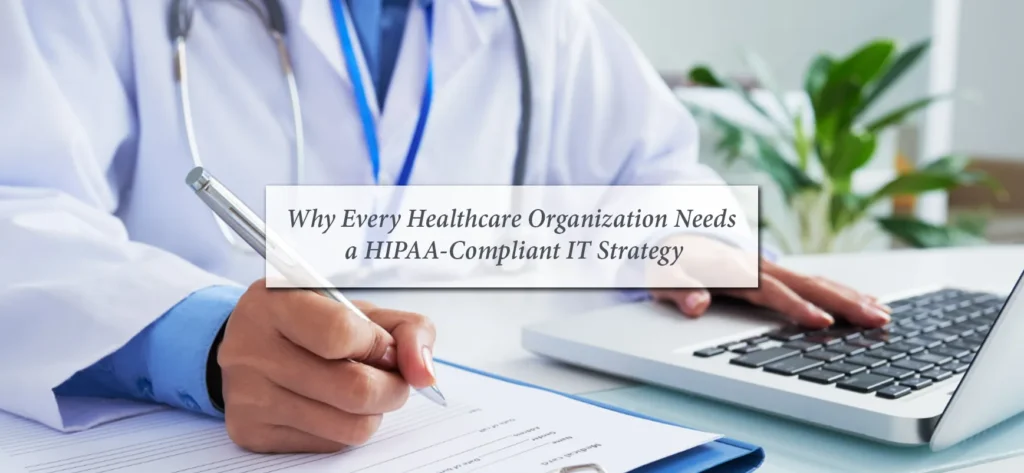In today’s healthcare landscape, managing sensitive patient information securely and efficiently is not just essential—it’s mandatory. The Health Insurance Portability and Accountability Act (HIPAA) sets strict standards for data privacy and security, making a robust, HIPAA-compliant IT strategy crucial for all healthcare organizations. In this blog, we explore why every healthcare provider must prioritize HIPAA compliance in their IT strategy and how doing so can protect patients, enhance efficiency, and safeguard organizational integrity.
Understanding HIPAA and Its Importance
HIPAA is a federal law established to protect sensitive patient health information from being disclosed without the patient’s consent or knowledge. The act provides clear guidelines on how patient information should be handled electronically and physically, setting standards for healthcare providers, insurers, and third-party administrators.
Key Components of HIPAA Compliance:
- Privacy Rule: Protects the privacy of individually identifiable health information.
- Security Rule: Sets standards for securing electronic protected health information (ePHI).
- Breach Notification Rule: Requires covered entities to notify affected individuals and regulators in case of a data breach.
Why Your IT Strategy Must Be HIPAA-Compliant
- Protect Patient Privacy and Trust: Patient trust is the cornerstone of healthcare. Ensuring HIPAA compliance reassures patients that their sensitive data is secure, fostering stronger patient-provider relationships.
- Avoid Costly Data Breaches and Fines: Non-compliance with HIPAA can result in significant financial penalties, legal action, and damage to an organization’s reputation. A robust HIPAA-compliant IT strategy reduces these risks significantly.
- Enhance Data Security: Complying with HIPAA standards involves implementing robust cybersecurity measures, data encryption, access controls, and secure data handling practices, all of which significantly bolster your organization’s overall security posture.
- Ensure Business Continuity and Reliability: HIPAA-compliant IT strategies include detailed contingency plans for data backup, disaster recovery, and emergency operations, ensuring your healthcare services remain uninterrupted, even during unforeseen disruptions.
Core Elements of a HIPAA-Compliant IT Strategy
Secure Data Storage and Encryption
Storing sensitive patient information securely—both on-premises and in the cloud—is essential. Strong encryption methods for data in transit and at rest are foundational practices.
Access Control and Identity Management
Implementing strict user authentication and role-based access ensures that only authorized personnel can access sensitive data, significantly reducing the risk of internal breaches.
Regular Security Audits and Assessments
Consistent monitoring, auditing, and evaluation of IT systems help identify vulnerabilities before they become critical issues. Regular security assessments should be integral to your compliance strategy.
Employee Training and Awareness
Healthcare professionals must be regularly trained in HIPAA regulations, cybersecurity best practices, and data handling protocols. Educating your staff significantly reduces the risk of accidental breaches.
Robust Disaster Recovery and Backup Planning
A comprehensive disaster recovery plan—including regular data backups and recovery testing—is vital to maintaining operational continuity and ensuring data integrity.
Real-Life Impact: Success Stories of HIPAA Compliance
- Large Hospital Network: By adopting stringent HIPAA-compliant cloud solutions, the network prevented potential breaches, enhanced patient trust, and streamlined regulatory reporting.
- Specialty Clinics: Clinics integrating HIPAA-compliant patient portals improved patient satisfaction, reduced administrative tasks, and enhanced secure communications.
Steps to Develop a HIPAA-Compliant IT Strategy
- Assess Current Systems: Conduct a thorough audit to identify compliance gaps.
- Establish Clear Policies: Develop clear, written policies regarding data privacy, security, and breach management.
- Implement Necessary Technology: Deploy secure, compliant software and hardware solutions.
- Educate Staff: Regularly train your employees on compliance requirements and security best practices.
- Monitor and Audit: Continuously monitor systems, perform regular audits, and adjust your approach as needed.
Compliance is Key to Healthcare Excellence
A HIPAA-compliant IT strategy isn’t merely a regulatory requirement—it’s fundamental to maintaining patient trust, ensuring operational excellence, and protecting your healthcare organization from significant financial and reputational risks.
Partner with Optima Solutions to build a robust, HIPAA-compliant IT infrastructure tailored specifically for your healthcare organization.
Contact Optima Solutions today!
To discuss your compliance strategy and discover how we can support your path to secure, efficient healthcare delivery.
